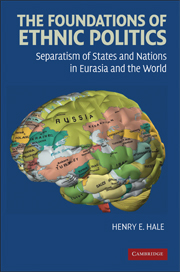Book contents
- Frontmatter
- Contents
- Acknowledgments
- Note on Transliteration
- 1 INTRODUCTION
- Part I Theory with Worldwide Examples
- 2 THE NEED FOR A MICROFOUNDATIONAL THEORY OF ETHNICITY
- 3 A RELATIONAL THEORY: ETHNICITY IS ABOUT UNCERTAINTY, WHEREAS ETHNIC POLITICS IS ABOUT INTERESTS
- 4 A THEORY OF NATIONAL SEPARATISM IN DOMESTIC AND INTERSTATE POLITICS
- Part II Case Comparisons: Separatism in Eurasia
- Part III Conclusion
- Index
- Other Books in the Series
- References
4 - A THEORY OF NATIONAL SEPARATISM IN DOMESTIC AND INTERSTATE POLITICS
Published online by Cambridge University Press: 05 September 2012
- Frontmatter
- Contents
- Acknowledgments
- Note on Transliteration
- 1 INTRODUCTION
- Part I Theory with Worldwide Examples
- 2 THE NEED FOR A MICROFOUNDATIONAL THEORY OF ETHNICITY
- 3 A RELATIONAL THEORY: ETHNICITY IS ABOUT UNCERTAINTY, WHEREAS ETHNIC POLITICS IS ABOUT INTERESTS
- 4 A THEORY OF NATIONAL SEPARATISM IN DOMESTIC AND INTERSTATE POLITICS
- Part II Case Comparisons: Separatism in Eurasia
- Part III Conclusion
- Index
- Other Books in the Series
- References
Summary
To demonstrate the potential of the broad relational theory of ethnicity just outlined, this chapter uses it to develop a more concrete theory of national separatism. Separatism thus serves as a case of the more general phenomenon of ethnic politics that the relational theory is intended to illuminate. It is a useful case for several reasons. For one thing, it is reflective of what this volume has called the great puzzle of ethnic politics. Next to nearly every region with a strong separatist movement (Slovenia in Yugoslavia, Ukraine in the USSR, the Igbo territory in Nigeria's First Republic, and Quebec in Canada, among others), one also finds regions where the main ethnic minority representatives favor continued political integration (Montenegro in Yugoslavia, Uzbekistan in the USSR, the Yorubaland in Nigeria, and Nunavut in Canada). The puzzle even reaches international relations, as Turkey has been challenging the European Union (EU) to admit it, while Norway remains a stalwart of separation. These differences are extremely important, with separatism linked to the breakup of states like the USSR and the outbreak of civil war in countries like Nigeria. Of course, separatism is not necessarily bad: Many members of oppressed minority groups see it as their best hope of escaping repression in states dominated by representatives of other groups.
The present chapter begins by showing that despite some seminal insights, the dominant theories of secession (generally rooted either in ethnicity-as-conflictual or ethnicity-as-epiphenomenal theory) do not satisfactorily account for observed patterns.
- Type
- Chapter
- Information
- The Foundations of Ethnic PoliticsSeparatism of States and Nations in Eurasia and the World, pp. 57 - 90Publisher: Cambridge University PressPrint publication year: 2008



